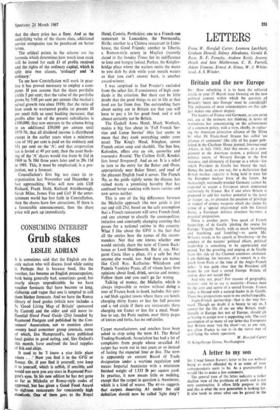Britain and the new Europe
LETTERS
From W. Horsfall Carter, Leonora Lockhart, Graham Dowell, Sidney Abrahams, Gerald B. Rose, R. F. Fernsby, Andrew Keith, Jeremy Heath and lain Mathewson, C. R. Purnell, Adam 7'ruscoe, Ernest A. Gross, W. J. White-. head, A. S. Winder.
Sir: How refreshing it is to have the editorial article in your 17 March issue focusing on the new political context within which the question of Britain's 'entry into Europe' must be consideieill The psittacosis of most commentators on this sub- ject makes one almost despair.
The leaders of France and Germany, as you point
out, are at the moment not thinking in terms of institutions but concentrating on the achievement of a common policy, with a view, chiefly, to replac- ing the American protective alliance of the 'fifties by what Dr Franz-Josef Strauss has called 'an alliance of continents' (the title of his paper pub- lished in the Chatham House journal, international Affairs, in July 1965). And this means, as a com- plement to the American system, a political and defence union, of Western Europe in the first instance, and ultimately of Europe as a whole—for which President de Gaulle has blazed the trail. Hence the need, as you say, for a declaration that British nuclear capacity is being held in trust for the European nuclear force of the future. An increasingly nationally-minded Germany cannot be expected to accept a European union dominated exclusively by France. But if and when Britain is prepared to add her nuclear potential to the force de frappe, i.e., to abandon the position of privilege in respect of atomic weapons which she claims by virtue of a 'special relationship' with the United States, a European defence structure becomes a practical proposition.
There is another point. You speak of French leadership, of dc Gaulle 'plotting the course for Europe.' Exactly. Surely, with so much 'mumbling and bumbling and fumbling'—to quote Mr. Wilson's words in his speech at Strasbourg—in the conduct of the nations' political affairs, political leadership is something to be appreciated and prized. Yet the growling and sniping at de Gaulle from this side of the Channel continues unabated. I am thinking, for instance, of a remark in a dis- patch from Paris at the time of the Anglo-French talks: 'it was quite clear that the President still hopes he can lead a united Europe. Britain, of course. does not accept this.'
And why not, pray? For reasons of geography, history--and, let us say it, maturity—France must he the core and centre of a united Europe. France today is blessed with a natural leader in de Gaulle. These two propositions seem to me unchallengeable. Anglo-French partnership—that is the way for- ssard. Though no doubt it is heresy to say so, I cannot for the life of me see why Britain, tradi- tionally in Europe but not of Europe, should jib at having to accept now a supporting role. The cool assumption of so many of our latter-day Europeans that Britain must 'run the show'—or, at any rate. not allow France to run it—is the surest way of stultifying the whole operation.


































 Previous page
Previous page